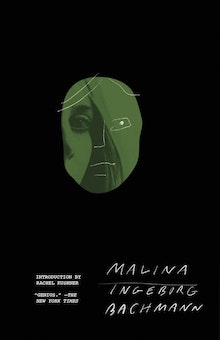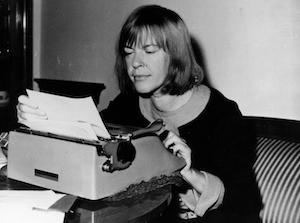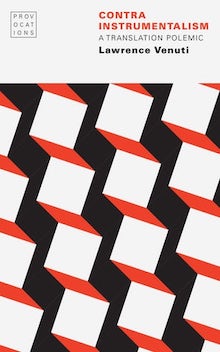Value & Controversy
A few weeks ago, I wrote a post on Vernon Subutex I by Virginie Despentes, translated by Frank Wynne, and Sympathy for the Translator by Mark Polizzotti in which I teased a future post (this one!) in which the “value” and “controversy” terms would be inverted: the nonfiction book from the translator would supply the heat, the work of fiction, the stability.
Although I’m dying to get into the Venuti part of this book—maybe in part because I’m simultaneously watching the NL Wild Card game as I write (Brewers up 2-0 with no outs in the top of the 1st!) and there’s some sort of weird parallel between two teams battling it out, and a theorist trying to pick apart centuries of ingrained thinking about translations?—I’m going to stick to my original concept . . . So, let’s talk a bit about Malina by Ingeborg Bachmann, translated from the German by Philip Boehm, which New Directions reissued earlier this year.
 If you’re expecting an incisive, smart analysis of Malina, then, well, you’ve probably never read any of these posts, but, also, here, in brief, is what I think of this novel: It’s fucking great. It’s a weird book, in which it’s hard to find your footing, as each of the three sections unveil different aspects of the mind of the narrator—a female writer in Vienna involved with two men. (Read into that what you will.)
If you’re expecting an incisive, smart analysis of Malina, then, well, you’ve probably never read any of these posts, but, also, here, in brief, is what I think of this novel: It’s fucking great. It’s a weird book, in which it’s hard to find your footing, as each of the three sections unveil different aspects of the mind of the narrator—a female writer in Vienna involved with two men. (Read into that what you will.)
That might sound straightforward enough—as jacket copy, it gives you something to hang on to—and the first part is pretty emotionally charged.
Because Ivan and I only tell each other good things and sometimes things intended to make each other laugh (but without ever laughing at anyone), because we’re even able to smile when preoccupied and so find the right way to get back on track, to get back together, I hope we might effect a general contamination. Slowly we will infect our neighbors, one after the other, with the virus whose most likely name I know already, and if an epidemic should ensue, it would benefit all humanity. But I also realize how difficult it is to catch, how long one has to wait to be ripe for contamination, and how difficult, how completely hopeless things were for me before it happened!
*
I’m thinking about Ivan.
I’m thinking about love.
About injections of reality.
About their lasting only a few hours.
About the next, more potent injection.
I’m thinking in silence.
I’m thinking it’s late.
It’s incurable. And it’s too late.
But I survive and think.
And I’m thinking it will not be Ivan.
Whatever’s ahead, it will be something different.
I live in Ivan.
I will not outlive Ivan.
*
I would like to write an incunabulum standing up, for today twenty years have passed since I’ve loved Ivan, and it’s been one year and three months and thirty-one days on the 31st of the month since I’ve known him [. . .]
*
Ivan and I: the world converging.
Malina and I, since we are one: the world diverging.
Part 2, “The Third Man,” is much darker, more dangerous, more unnerving, a bit more imagistic, definitely filled with abuse. I mean, shit, Bachmann is a writer’s writer.
My father came home once more just by accident. My mother is holding three flowers, the flowers for my life, they aren’t red, or blue, or white, but they must be for me, and she throws the first one in front of my father, before he can approach us. I know she’s right, she has to throw him the flowers, but now I also know that she knows everything, incest, it was incest, but I’d still like to ask her for the other flowers, and I watch my father in deadly fear as he tears the other flowers from my mother’s hand, to take his revenge against her as well, he tramples them, he stomps on all three flowers, as he has often stomped about when enraged, he treads on them and tramples, as if he were trying to kill three bugs, that’s how much my life still means to him. I can’t look at my father anymore, I cling to my mother and start to scream, yes, that’s what it was, it was him, it was incest. But then I notice that . not only is . my mother silent and unmoved, but . from the beginning my own voice has been without sound, I’m screaming but no one hears me, there’s nothing to hear, my mouth is only gaping, he’s taken away my voice as well, I can’t pronounce the word I want to scream at him, and as I am straining with my dry, open mouth it comes once more, I know I’m going crazy, and in order to stay sane I spit into my father’s face, but there’s no saliva left, hardly a breath from my mouth reaches him. My father is untouchable. He is unmovable.
 Really: Just go read this book. Whatever words I use to talk about it will be inadequate, will approximate its power and craft in ways that will seem embarrassingly lame tomorrow morning. Especially since I know that Rachel Kushner’s introduction (fortuitously reprinted at the New Yorker) is so much better, and is the piece you should read about Malina.
Really: Just go read this book. Whatever words I use to talk about it will be inadequate, will approximate its power and craft in ways that will seem embarrassingly lame tomorrow morning. Especially since I know that Rachel Kushner’s introduction (fortuitously reprinted at the New Yorker) is so much better, and is the piece you should read about Malina.
Also, it’s the pivot that I’ve been building toward . . .
Malina was initially written in 1971, and this Philip Boehm translation (great guy! great translator! I met him at the PEN West gala last year when I was on the jury that awarded him the Translation Prize for Chasing the King of Hearts by Hanna Krall) came out originally in 1990. The only truly “new” aspects of this book are the introduction (stellar!) and the cover (quite good!).
To anyone in the industry, this whole section is going to be remedial and boring. (Unlike the other things I write? right? right?) For everyone else: It’s impossible to underestimate the value of a press’s backlist. If managed correctly, the books you’ve published over your past decades—titles your newer employees probably haven’t even heard of—can be the goldmine that keeps your press afloat for decades.
I can’t tell you how many members of Literary Twitter encountered Malina for the first time this summer. A lot! Despite the fact that this was issued in 1990, again in 1999 (when I first read it), and now, 20 years later.
On the first episode of the new season of the Two Month Review (you can download this podcast tomorrow morning), Dan Wells of Biblioasis mentions how you can publish a great book that goes unnoticed because you published it six months too early or too late.
Now, look back over the New Directions catalog. There are dozens of books that might have been published at the “right” time originally, but time has moved on, and they need to be refreshed. No. They need to be reintroduced. Every six years there are enough new additions to the literary community that the most lasting books can find a significant new audience.
For YEARS, this was the bread and butter of Dalkey Archive Press and the New York Review Books classics series. Remember this? Well, if you don’t, you need to check it out. We got a cool, of-the-moment writer to tell you why it’s so good, why this is a sort of bridge to literary history. This is one way to join our group.
I’ve decided right this second (as Scherzer strikes out Hiura to save the Nationals’ season) that this is a provable fact: There are always 10 times more interesting books not in bookstores than interesting new titles that came out within the last year.
 That seems bold. Provocative. A good pivot to the next section of this post? Not yet, not yet.
That seems bold. Provocative. A good pivot to the next section of this post? Not yet, not yet.
Over the past year, how many titles have been published that will be reprinted with new introductions thirty years from now? Like, maybe 4? Is 4 too high? Let’s say there are 20. Over the course of human writing from 1900-2000, are there 200 amazing books that none of us have heard about because capitalism and social trends and the fact that publishing employees are underpaid and no one thinks anymore and everyone just tries to be the “cool new thing” and . . .
Holy shit, I am old. I turned 44 last week, which means that I’ve been alive for approximately five different Henry Green rediscoveries. (I even participated in one!)
Everything can be new again. Which is encouraging. There’re always new readers who will read these amazing books. These life-changing books. Like our reissue of The Invented Part in 2039 with a new cover and an introduction by an author who is currently twelve years old. Literally.
*
One thing that I’ve always harped on in my translation classes is how there is no stable “original,” no “infallible genius writer.” It sometimes comes out as anti-German (because there’s no one quite as enamored with the idea of received genius as the German literary establishment), but it’s not intentional—I just always found this naive and annoying.
Which is why Lawrence Venuti’s new book, Contra Instrumentalism: A Translation Polemic is so exciting. This review by Matt Reeck in Public Books is so good, so smart—go check it out.
 But to summarize—to the best of my 8th inning ability—Venuti’s statement, it is this: Leave behind the core idea that a source text has fixed, unchanging elements that need to be conveyed in a translation. What would those even be? Not only is the source, original text in flux, but the concept of some sort of “instrumental” (to adopt Venuti’s incredibly helpful terminology) viewpoint in which the source is perfection and a translation is an approximation of an X factor (word meaning, impact, intent, reaction among readers of the original) is so philosophically dense that it needs to be overthrown.
But to summarize—to the best of my 8th inning ability—Venuti’s statement, it is this: Leave behind the core idea that a source text has fixed, unchanging elements that need to be conveyed in a translation. What would those even be? Not only is the source, original text in flux, but the concept of some sort of “instrumental” (to adopt Venuti’s incredibly helpful terminology) viewpoint in which the source is perfection and a translation is an approximation of an X factor (word meaning, impact, intent, reaction among readers of the original) is so philosophically dense that it needs to be overthrown.
In the place of “lost in translation,” and “poetry is what’s lost in translation,” and every other silly, trite, misleading statement we’ve all heard, Venuti proposes a “hermeneutic approach” in which we start from the core concept that every translation is an interpretation of the original text and the translation is also a version of that interpretation. By starting from that viewpoint, the discussion around and evaluation of translations—and the field as a whole—can advance beyond the conversations that have been weighing it down for centuries.
To be honest, I don’t see the tenets of Venuti’s book to be a provocation. At all. It seems natural to me, and has provided me with the terminology and perspective to really clarify the muddier statements about translation I’ve been trying to work through with students (and here) for years. Even if there are times when the language reaches the post-structural academic stratosphere, it’s a book that’s definitely worth reading and, in Venuti’s words, change the way you think about translation.
I see this book functioning as a device of “desiring-production” in [Deleuze & Guattari’s] sense, producing in you, my reader, the will to critique a model that has been so deeply entrenched in thinking about translation for so long as to be unconscious, knee-jerk, rote. The difficulty or apparent inability to criticize instrumentalism means that coolly detached reasoning is not enough to be persuasive, this model is heavily cathected with desire, and the provocation of polemic has become necessary to release and direct it.
Even the chapter of the book on subtitling—the one I thought I would be least interested in—was absolutely fascinating. There’s a lot to mull over, but the ways in which he dismantles instrumentalism and demonstrates how it’s baked into so many seemingly innocent comments and metaphors can definitely open things up for a translator, scholar, or reader. I know it has for me . . .
It will be really interesting to see how the translation community reacts to this book, though. Although I think his ideas are sound, Venuti does nothing here to alter his reputation for being incredibly direct and willing to go after other theorists or translators.
I have to admit that, in the most self-involved way, I was terrified at the start of this that he would rip apart some crap article that I wrote in the past. It wouldn’t be hard! But I’m also nowhere noteworthy enough to merit any such attention. There are some pretty pointed attacks in here though . . . Here’s a smattering, starting with a response to a quote from Emily Wilson that she “wants to be saying, after multiple different revisions: This is the best I can get toward the truth.”
Whatever Wilson believes the truth of the Odyssey to be, she has assumed the existence of an invariant, contained in the Greek text, and that becomes the goal that she works “toward” achieving through successive revision of her translation. Wilson obviously remains unaware of any logical inconsistency in her comments. So does Wyatt Mason, a literary translator himself, who authored the profile and unwittingly chose to emphasize Wilson’s instrumentalism by concluding with it.
About Polizzotti’s Sympathy for the Traitor, which I read, enjoyed, and plugged in the aforementioned “Controversy & Value” post:
Polizzotti’s text does not offer a coherently argued account of translation substantiated by exhaustive research, but rather a string of largely unexplained assertions couched in overstatement, metaphor, and cliché. [. . .] His manifesto, not surprisingly, is riddled with contradictions that display how the instrumental model cuts off thinking about translation among translators and publishers.
Even Emily Apter’s Against World Literature comes under scrutiny:
Apter has simply asserted her reading of [Eleanor] Marx’s translation [of Madame Bovary], not argued it with textual analyses and historical research. It is purely speculative, lacking any grounding in empirical data, making only the rare textual reference. It is the epitome of theoreticism, a fetishizing of theoretical concepts at the expense of linguistic, cultural, and social specificity. For the fact is that Apter is interested only in theory, not in translation. [. . .] Apter’s reliance on the current critical orthodoxy leads to half-baked formulations that require more careful exposition to make sense, but that would still seem of dubious value in understanding translation.
Is Venuti the translation studies equivalent of Tim Parks? Not in terms of their ideas (Parks is most definitely an instrumentalist), but in the way that neither are afraid to criticize specific authors, translators, or works.
But for Parks, this has earned him a bit of a dodgy reputation. I personally find his takes to be stimulating and interesting, but there are a lot of people I know who think of him as simply a curmudgeon whose translation “criticism” is just “mean.” Mostly they don’t care for his takedowns of specific translations (like his repeated criticisms of Deborah Smith for her Han Kang books), but once you get a reputation like that, it’s hard to win people back over.
I can’t say for sure how well Parks’s keynote at the American Literary Translators Association conference in 2017 was received, but I’m going to guess that it was “mixed”—much like the reaction to Venuti’s keynote back in 2011.
Translators—and academics—can be pretty sensitive about things like this. But I do think what Venuti is doing here is a bit different than simply hacking apart someone’s work. He’s examining a very ingrained way of thinking that has been rather damaging to the reception, promotion, and study of translation. Although some of the above might seem a bit personal (which is often the complaint about Parks), I read the intent as being more aimed at how instrumentalism has even infected some of the smartest translation thinkers.
(Also: That Nationals-Brewers game was WILD. I’m finishing this a day late because I got sucked up in Soto’s 8th inning heroics. And Grisham’s flub.)


Leave a Reply